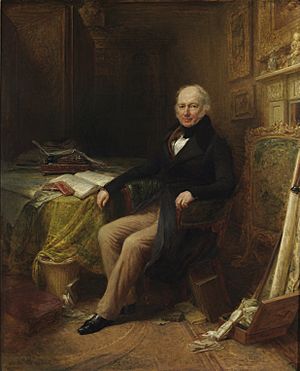Thomas Baring (1799–1873) facts for kids
Quick facts for kids
Thomas Baring
|
|
|---|---|
 |
|
| Member of Parliament for Great Yarmouth |
|
| In office 1835–1837 Serving with Winthrop Mackworth Praed
|
|
| Preceded by |
|
| Succeeded by |
|
| Member of Parliament for Huntingdon |
|
| In office 1844–1873 Serving with Jonathan Peel (1844–1868)
|
|
| Preceded by |
|
| Succeeded by | Sir Jonathan Burgess Karslake |
| Personal details | |
| Born | 7 September 1799 |
| Died | 18 November 1873 (aged 74) |
| Resting place | St. Mary the Virgin Churchyard, Micheldever, Hampshire, England |
| Political party | Conservative |
| Parent |
|
| Relatives |
|
Thomas Baring (born 7 September 1799 – died 18 November 1873) was an important British banker and a politician from the Conservative Party. He played a big role in his family's banking business and served in the British Parliament for many years.
Contents
Early Life and School
Thomas Baring was the second son of Sir Thomas Baring, 2nd Baronet. His mother was Mary Ursula. He had an older brother, Francis Baring, 1st Baron Northbrook, and a younger brother, Charles Baring. Thomas went to school at Winchester College, which is a famous school in England.
Banking Career
Since Thomas was the second son, he was expected to work in the family's business, which was banking. He started his career at a company called Hope & Co. in Amsterdam. He did very well there and became a partner in 1824.
Joining Baring Brothers & Co.
Later, Thomas wanted to join his family's main bank, Baring Brothers & Co.. Even though his father tried to help him, his uncle, Alexander, didn't want him to join at first. But in 1828, Thomas finally became a partner in the London office.
Growing the Business
In the 1830s and 1840s, Thomas worked hard to make Baring Brothers & Co. more well-known in Europe. He used the knowledge and connections he gained from his time at Hope & Co. to try and expand the bank's reach. However, other older banks like Rothschilds were already very strong in Europe.
Thomas also spent a lot of time promoting the bank in North America, especially in the United States. He first visited the US in 1829 and made many more trips after that.
Leading the Bank
After 1848, several senior partners of the bank passed away. Thomas Baring and an American partner named Joshua Bates became the main leaders of the bank in the 1850s. During this time, Baring Brothers & Co. became the financial agent for the governments of the US and Canada. This meant they handled money matters for these countries.
In the 1860s, Joshua Bates became less active. Thomas Baring and another American partner, Russell Sturgis, took charge. To bring new energy to the bank, Thomas arranged a merger in 1867 with another London bank, Finlay Hodgson and Co. This brought new talent, like Kirkham Daniel Hodgson, who had been a Governor of the Bank of England, into Baring Brothers & Co. Thomas's nephew, Thomas Charles Baring, also joined the bank that same year.
Other Financial Roles
Even though he was very busy with the bank, Thomas Baring also took on other important roles in the financial world. He was the Chairman of Lloyd's, which is a famous insurance market. He was also a director of the Bank of England. Like his father, he was the President of the London Institution and a Fellow of the Royal Society, which is a group for important scientists.
Political Career
Thomas Baring also had a career in politics. He became a Member of Parliament (MP) for Great Yarmouth in 1835. He held this seat until 1837. Later, he represented Huntingdon in Parliament from 1844 until 1873. He was a close friend and associate of Benjamin Disraeli, who later became the Prime Minister. Even though he was offered many important government jobs, Thomas Baring always turned them down.
Later Life
Thomas Baring passed away in November 1873, when he was 74 years old.
 | Sharif Bey |
 | Hale Woodruff |
 | Richmond Barthé |
 | Purvis Young |

